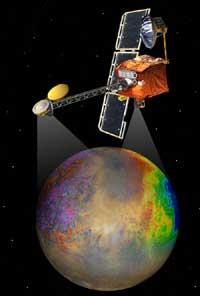NASA’s Mars Odyssey will travel tomorrow to Mars
Mars Odyssey probes "2001: In tribute to the science fiction film "Odyssey in Space", it will take 200 days to reach Mars. On October 24 the spacecraft will light its engines to be trapped in the orbit of Mars and form an elliptical orbit around the planet every 17 hours at first and then every 11 hours.

Mars Odyssey spends a Martian year (about 29 terrestrial months) collecting data in the orbit of Mars and NASA expects to meet the schedule this time. In fact, the two instruments sent in 1999 for the study of the planet, Mars Climate Orbiter and Mars Polar Lander, failed. The first was due to mathematical errors of engineers, it seems that a group of engineers used the British units and the other team used the metric system. NASA considers that parts of the spacecraft are still orbiting Mars and that they can burn when the surface of the planet falls or falls. Mars Polar Lander hit the skin because an engine closed early.
Most tests on Mars have gone wrong. The first attempt was made by the Soviets in 1960. Although NASA has been more fortunate, only 60% of the attempts have been successful. However, NASA was the first success on Mars thanks to Mariner 4 in 1964.
On this occasion, Mars Odyssey, for the collection of geological and atmospheric data, has three complex measuring tools. The gamma wave spectrometer will collect the amount of hydrogen and can give the water footprint. On the other hand, to study the minerals of the planet, it will use an imaging system that detects thermal radiation. Finally, a radiation meter will indicate the risk of radiation for astronauts that can be sent to Mars.
With the information gathered by these tools, NASA hopes to be able to choose the best scenario for the first ship to be shipped to the surface of Mars in the next decade. Take the opportunity to clarify whether the "channels" detected on Mars are caused by water or carbon dioxide, on which a debate has opened in recent days. And of course, the usual question: will you perceive any trace of life?
Buletina
Bidali zure helbide elektronikoa eta jaso asteroko buletina zure sarrera-ontzian











